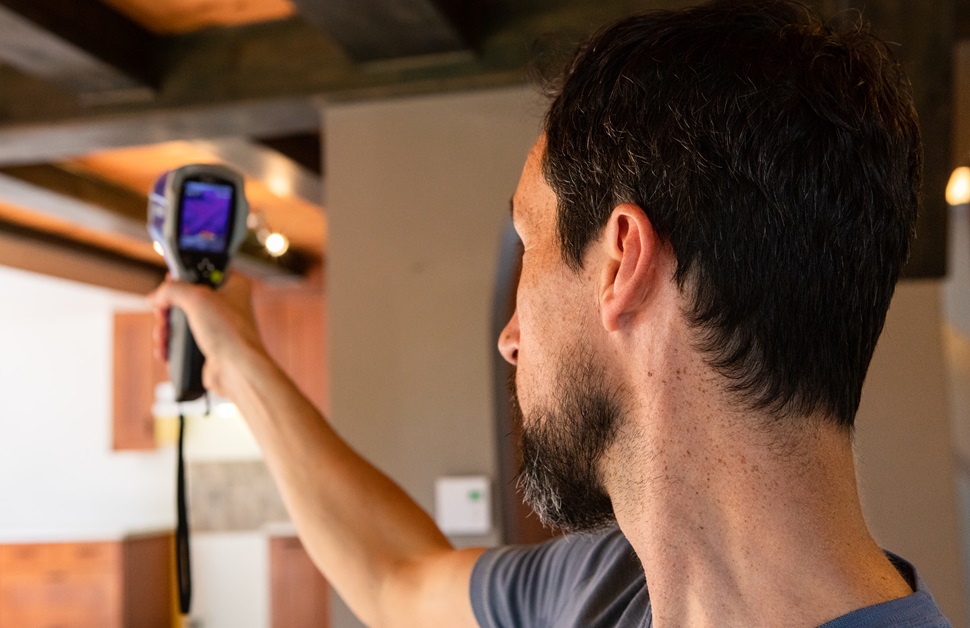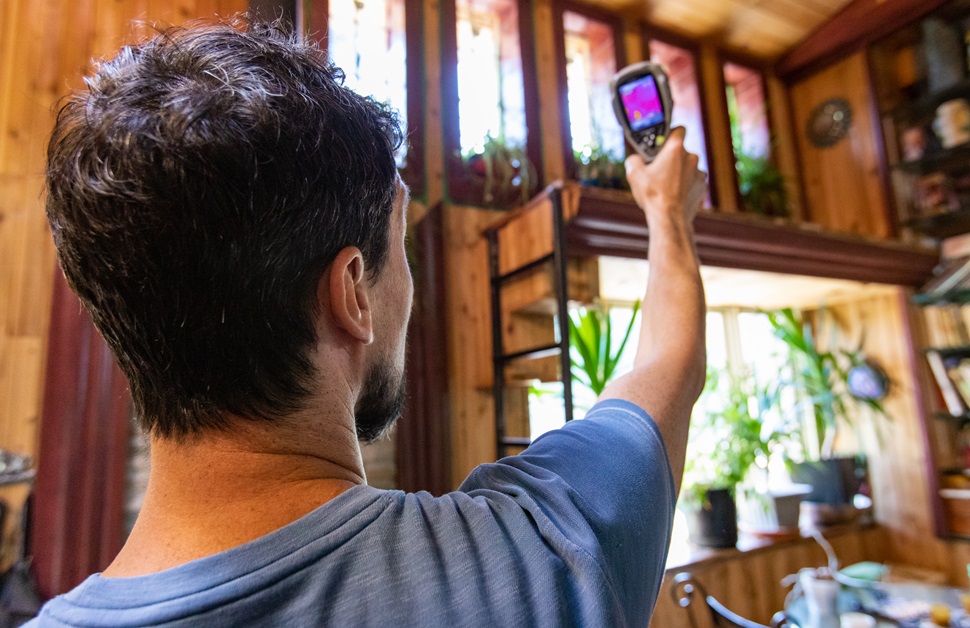Indoor Air Quality Services
Between home and work, most of the population spends the majority of their time indoors. When these environments possess indoor air quality issues, however, anyone present within the building could suffer negative effects on their well-being. Likewise, any individuals who are undertaking development works on the building could experience a selection of potential problems, ranging from reduced productivity to serious medical conditions.
If a developer wants to ensure that a structure doesn’t possess poor indoor air quality, avoid endangering construction workers with poor air quality, or simply maintain a grasp on policies executed by their local authority, an indoor air quality assessment would be the suitable next step to take. Under the impartial advice of an air quality consultant, any and all concerns regarding indoor air quality can be addressed and mitigated.

What is an Indoor Air Quality Assessment?
Within the category of air quality assessments, indoor air quality assessments focus solely on the condition of air quality within buildings and other structures. Due to the bespoke nature of both residential and commercial buildings, it is common for indoor air quality assessments to be tailored to the specifications of the development site and planning project, as well as taking into consideration the required level of detail and aims from the perspective of the client.
Planned indoor air quality inspections are often a part of the construction and operational phase of a development. At this point, indoor air quality testing will advise on the next steps for conducting a project accordingly and with deliberation to the health and safety of construction workers undertaking development works and building users once the development is complete. Data regarding indoor air quality (IAQ) can then be used to support applications for planning permission.
Importance of Indoor Air Quality
It is crucial for indoor areas to facilitate a safe and healthy environment, as without it, air pollution can welcome a wide range of bugs, chemicals, dust and other contaminants that are all equally capable of generating adverse health effects in humans present within the building. Once air pollutants have reached indoor environments, they can go undetected, linger in the atmosphere for days or even weeks, and depending on the composition of the elements, potentially activate ill health in building occupants.
More specifically, indoor pollutants can house a comprehensive list of components, such as carbon dioxide, carbon monoxide, hydrogen sulfide, hydrocarbons and dust containing potentially volatile organic compounds (VOCs). Considering how pollutants can carry any of the above properties and so many more, it is possible for exposure to poor indoor air quality to develop a myriad of short and long-term health conditions, such as asthma, bronchitis, chronic obstructive pulmonary disease (COPD), gastrointestinal and neurological disorders, kidney, liver, skin and heart disease, lung cancer, respiratory disease, and stroke.
Benefits of Indoor Air Quality
Not only will a good standard of indoor air quality reduce the likelihood of ill health, but it will also promote other advantages, such as:
- Balancing humidity
- Eliminating odour
- Enhancing breathing
- Improving sleep
- Lowering utility bills
- Minimising environmental triggers
- Preventing the spread of airborne diseases
- Removing allergens
What Affects Indoor Air Quality?
An extensive array of minor and major factors can play a role in worsening the air quality of an indoor area, such as but not limited to:
- Air fresheners
- Building materials
- Candle smoke
- Cigarette and e-cigarette smoke
- Cleaning products
- Cooking smoke
- Electric heaters
- Fireplaces
- Fuel-burning heat sources
- Furnishings
- Mould
- Paint and varnish
- Pesticides
- Pets
- Radon
- Stored vehicles and machinery
Indoor Air Quality Solutions
Indoor Air Quality Assessment Process
At the start of an air quality assessment, the surveyor will speak to the developer about any known indoor air quality issues in the internal environment. During any form of indoor air quality investigations, the priority will be on safeguarding the individuals that are performing tasks in the building as part of the development and other building occupants, now or in the future.
Over the course of an inspection, an air quality consultant will generally collect air samples, monitor for indications of visible mould and water damage, measure relative humidity, temperature and ventilation, gauge potential sources of pollution and exposures to pollutants, look over existing data such as maintenance records, photographic evidence and residue from rodents and other pests, study airflow throughout the premises, and deliver recommendations based on the results of the survey.
Indoor Air Quality Report
Immediately following the completion of the assessment, a report containing all information will be put together by the air quality surveyor. Alongside a general explanation of the inspection process, it will provide the developer with expert advice that will enable the planning project to continue and the local planning authority of the local council with confirmation that a planning application can be accepted or any remaining changes that are needed to satisfy their needs.
Recommendations displayed in a report may include advised further surveys such as indoor air quality monitoring needed to retrieve the necessary level of information from the development site, measures aimed to support the well-being of individuals present, conditions designed to prevent long-term exposure to poor air quality, and additional steps that could assist the aims of the client or the local authorities such as the use of air handling units and ventilation systems to improve air quality and ventilation hygiene.
Indoor Air Quality Standards
An approved code of conduct is essential towards demonstrating a universal approach to all exercises regarding the inspection of indoor air quality and the safe environmental conditions of everyone involved in the development works. Working in partnership with the Department for Environment, Food and Rural Affairs (DEFRA), the Air Quality Expert Group (AQEG) was assembled as an expert committee on air quality.
In a report from the AQEG, the functions of the committee were outlined, including duties to advise on current and future characteristics, levels, sources and trends of UK air pollutants, contribute to advancements in the assessment of indoor air quality through analysing, interpreting, judging and synthesising evidence, operate in line with the government’s principles for scientific advice and the Code of Practice for Scientific Advisory Committee (CoPSAC), provide advice and collaborate with key office holders in DEFRA, public bodies, the EU and expert groups, report to and support DEFRA’s Chief Scientific Adviser (CSA), and suggest priority areas for future work.
Across numerous sections in the report that are designed to protect individuals and the environment from indoor air pollution, one part covers the workplace exposure limits (WELs). The Control of Substances Hazardous to Health Regulations 2002 (COSHH) enforces that employers control all exposure to hazardous substances within a work environment. A workplace exposure limit ensures that workers are given parameters for operating close to substances that are perceived as harmful. Other policies offer similar protections, such as the Health and Safety at Work Act 1974 (HASWA).
Indoor Air Quality Equipment
Despite often requiring far fewer tools, indoor air quality testing could necessitate any number of highly specialised survey equipment, including such items as:
- Air velocity and indoor air quality tests
- Airborne particle counter
- Airflow meters
- Borescopes
- CO₂ monitors
- Continuous indoor air quality monitoring instruments
- Data loggers
- Dust monitors
- Environmental monitors (EVM)
- Gas sensors
- Humidity meters
- Indoor air quality meters
- Moisture meters
- Particle view software
- Real-time dust monitors
- Temperature and humidity monitors
- Thermal infrared cameras
- Vane anemometer and probes

Indoor Air Quality Solutions
Indoor Air Quality Consultants
Possessing experience in air quality testing, air quality monitoring and air quality assessments, the consultants from the partner company we refer clients to are equipped to offer all forms of indoor air quality surveying practices to clients. When you choose Arbtech, you are given the guarantees of universal quality regardless of who is assigned to assist you and a qualified, licensed and educated expert with all of the criteria needed for a high-standard assessment, even when it comes to us simply recommending a partner service provider to you.
Like with our team, the team we refer you to has consultants all over the country, allowing them to cater to all clients. Operating in this way means making the services cost-effective, subsidising the potentially weighty prices that may otherwise arise from travelling the length and breadth of the UK for each survey. You will also find that every member of the team has the correct attitude, insisting on individuals with the drive to give you everything you need from an assessment and the accompanying report.
Indoor Air Quality Quotes
Developments are capable of varying significantly in size and scale, and as such, it would be unfair to price up all assessments to support planning under the same approach. That way, clients working on small projects would end up paying the same as clients working on much larger projects, making for an unjust outcome for anyone in charge of a relatively basic development and unnecessarily heightening the cost of fundamental surveys.
Instead of operating in this way, Arbtech considers the details of each planning project, both in terms of the development plans and the specifications of the development site. Our team take this information on board and adds it to a baseline fee that applies to every type of assessment we provide. The client will then receive a no-obligation quote and can use that as the basis to decide whether or not to move forward with us.
Contact Our Team Now
For your free quote, all you need to do is call us directly via the number at the top of this page, fill out a quick quote form or provide your details on our contact page. We will then send you across to our partner, who will respond as quickly as possible, sending a concise quote for you to look over and allowing you the time to get back to us once you are satisfied with the conditions of our indoor air quality assessments.
Based on the schedule of your planning project, the service provider will work out a desirable date to attend your development site for the survey on indoor air quality. You will then receive the report within a short few days of the inspection, and providing no further surveys are needed, it will carry all of the information and measures that will see you succeed in obtaining planning consent from your local council.


